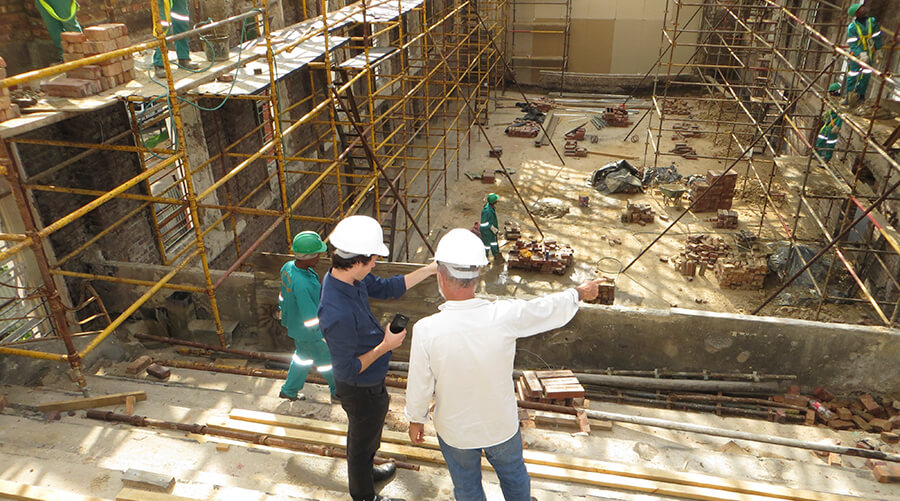Soft Skills vs Technical Skills in Construction:
How are they Applied?
See also: Project Planning
Just like in many other fields, soft skills and technical skills are both vital to a construction professional’s successful career. However, there’s a growing debate as to which of the two is more important, especially in this day and age when the demand for skilled construction professionals seems to be at an all-time high.
Whether you are looking to pursue a career in construction, or you are a hiring manager in this instrumental industry, this piece is for you. To paint the picture for you, let’s take a look at the various kinds of technical skills and skills that are needed in construction, as well as how they can be applied.

Training for Construction Professionals
Basically, construction training programs are designed to teach different skills, techniques, and processes related to the building and maintenance of structures, from large buildings and infrastructure to smaller projects such as furniture making, fittings, and fixture installation.
Training can also range from basic carpentry and masonry to more specialized areas such as electrical wiring and plumbing. Oftentimes, your professional training will begin with safety procedures and regulations, thereafter, progressing to more detailed topics such as building materials, tools, and techniques.
Depending on the institution, the course may also cover topics such as estimation, cost analysis, project management, and other basic skills that are essential for the successful completion of construction projects.
Learners who get trained at constructionready.org or similar institutions usually earn the credentials they need to be considered suitable for their first job in construction without paying for tuition.
It is also important to note that, nowadays, professional and experienced trainers also emphasize the importance of developing certain soft skills, including some that can be incredibly difficult to teach.
Common Technical Skills Needed in the Construction Industry
Without certain technical skills, it can be difficult if not impossible to get a job as a construction worker. These vital skills may include the ability to read and interpret blueprints, knowledge of construction materials, the ability to use power tools, and the ability to safely operate heavy machinery.
Blueprints Interpretation
Blueprints are a critical part of any construction project, and the ability to read and interpret them is essential. This includes understanding the various symbols used in construction plans, being able to visualize what the finished product will look like, and being able to determine the best sequence of steps to construct the project.
Knowledge of Construction Materials
Construction workers must be familiar with the different types of materials used in building projects. They should be able to select the most suitable materials for the job at hand.
Besides understanding the properties of different materials, construction professionals should also be able to estimate the quantities of materials needed for the project.
Use of Power Tools
The ability to use power tools properly is another important skill. This includes understanding the safety protocols associated with using different power tools and the proper techniques to use them for the job at hand.
Working with Heavy Machinery
Finally, operating heavy machinery is a skill that is often required in construction projects. This includes knowledge of the different types of machines available and their capabilities, as well as the ability to safely and effectively operate the machinery.
Common Soft Skills Needed in Construction Industry
While hiring managers often give priority to technical skills, soft skills are also incredibly important to professionals in the construction industry. Some of the most helpful interpersonal skills in this industry include:
Effective Communication
Effective communication is vital in the construction industry. With good communication skills, workers can easily and properly communicate with other team members, clients, suppliers, and other stakeholders. If you’re an effective communicator, it’s easier to explain ideas, provide feedback, and even help resolve project-related conflicts.
Problem-solving
Construction workers also need to be able to identify problems and come up with creative solutions. They must be able to analyse the situation and think critically before making decisions.
Collaboration
One thing about construction projects is that they are rarely a one-person show. Construction projects rely heavily on effective teamwork for successful completion.
Therefore, it’s good to be a team player who can effectively work together with others to achieve a common objective. This includes consulting and listening to each other’s ideas and feedback, and then working together to come up with the best solution.
Time Management
Time management is a crucial soft skill for any construction worker. If you’re a good time manager, it’s easier to meet strict project deadlines and avoid annoying construction clients as well as your superiors. The ability to plan and prioritize tasks can maximize efficiency and even help you stay on budget.
Attention to Detail
The tiniest mistake in a construction project can cause an entire structure to be considered unsafe for occupancy or use. Failing to notice a misalignment when erecting a structure could easily result in massive losses for the organization in the near or far future. Therefore, construction workers should have a keen eye for detail, enough to recognize potential problems early and take the necessary steps to fix them.
Further Reading from Skills You Need
The Skills You Need Guide to Interpersonal Skills eBooks.
Develop your interpersonal skills with our series of eBooks. Learn about and improve your communication skills, tackle conflict resolution, mediate in difficult situations, and develop your emotional intelligence.
In conclusion, a successful career in construction requires having a wide range of technical and soft skills. Workers who possess these skills will be better equipped to handle the various challenges that come with the job and will be able to see projects through to completion with minimal delays and hiccups.
About the Author
Cristina Par is a content specialist with a passion for writing articles that bridge the gap between brands and their audiences. She believes that high-quality content plus the right link building strategies can turn the tables for businesses small and large.


